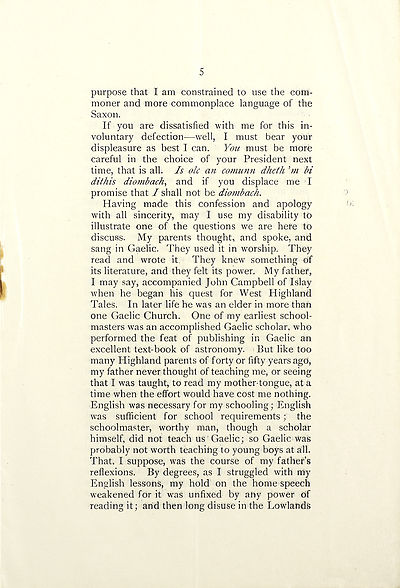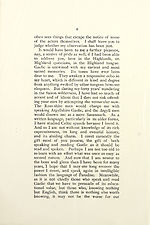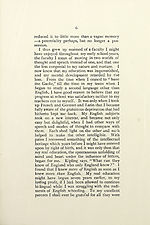Download files
Complete book:
Individual page:
Thumbnail gallery: Grid view | List view

5
purpose that I am constrained to use the com¬
moner and more commonplace language of the
Saxon.
If you are dissatisfied with me for this in¬
voluntary defection—well, I must bear your
displeasure as best I can. You must be more
careful in the choice of your President next
time, that is all. Is ole an comunn dheth )tfi bi
dithis diombach, and if you displace me I
promise that / shall not be diombach.
Having made this confession and apology
with all sincerity, may I use my disability tb
illustrate one of the questions we are here to
discuss. My parents thought, and spoke, and
sang in Gaelic. They used it in worship. They
read and wrote it. They knew something Of
its literature, and they felt its power. My father,
I may say, accompanied John Campbell of May
when he began his quest for West Highland
Tales. In later life he was an elder in more thafi
one Gaelic Church. One of my earliest school¬
masters was an accomplished Gaelic scholar, who
performed the feat of publishing in Gaelic an
excellent text-book of astronomy. But like too
many Highland parents of forty or fifty years ago,
my father never thought of teaching me, or seeing
that I was taught, to read my mother-tongue, at a
time when the effort would have cost me nothing.
English was necessary for my schooling; English
was sufficient for school requirements; the
schoolmaster, worthy man, though a scholar
himself, did not teach us'Gaelic; so Gaelic Was
probably not worth teaching to young boys at all.
That, I suppose, was the course of my father’s
reflexions. By degrees, as I struggled with my
English lessons, my hold on the home speech
weakened for it w7as unfixed by any power of
reading it; and then long disuse in the Lowlands
purpose that I am constrained to use the com¬
moner and more commonplace language of the
Saxon.
If you are dissatisfied with me for this in¬
voluntary defection—well, I must bear your
displeasure as best I can. You must be more
careful in the choice of your President next
time, that is all. Is ole an comunn dheth )tfi bi
dithis diombach, and if you displace me I
promise that / shall not be diombach.
Having made this confession and apology
with all sincerity, may I use my disability tb
illustrate one of the questions we are here to
discuss. My parents thought, and spoke, and
sang in Gaelic. They used it in worship. They
read and wrote it. They knew something Of
its literature, and they felt its power. My father,
I may say, accompanied John Campbell of May
when he began his quest for West Highland
Tales. In later life he was an elder in more thafi
one Gaelic Church. One of my earliest school¬
masters was an accomplished Gaelic scholar, who
performed the feat of publishing in Gaelic an
excellent text-book of astronomy. But like too
many Highland parents of forty or fifty years ago,
my father never thought of teaching me, or seeing
that I was taught, to read my mother-tongue, at a
time when the effort would have cost me nothing.
English was necessary for my schooling; English
was sufficient for school requirements; the
schoolmaster, worthy man, though a scholar
himself, did not teach us'Gaelic; so Gaelic Was
probably not worth teaching to young boys at all.
That, I suppose, was the course of my father’s
reflexions. By degrees, as I struggled with my
English lessons, my hold on the home speech
weakened for it w7as unfixed by any power of
reading it; and then long disuse in the Lowlands
Set display mode to:
![]() Universal Viewer |
Universal Viewer | ![]() Mirador |
Large image | Transcription
Mirador |
Large image | Transcription
| An Comunn Gàidhealach > An Comunn Gàidhealach Publications > Gaelic in the Highland schools > (5) |
|---|
| Permanent URL | https://digital.nls.uk/122769631 |
|---|
| Description | This contains items published by An Comunn, which are not specifically Mòd-related. It includes journals, annual reports and corporate documents, policy statements, educational resources and published plays and literature. It is arranged alphabetically by title. |
|---|
| Description | A collection of over 400 items published by An Comunn Gàidhealach, the organisation which promotes Gaelic language and culture and organises the Royal National Mòd. Dating from 1891 up to the present day, the collection includes journals and newspapers, annual reports, educational materials, national Mòd programmes, published Mòd literature and music. |
|---|---|
| Additional NLS resources: |
|

